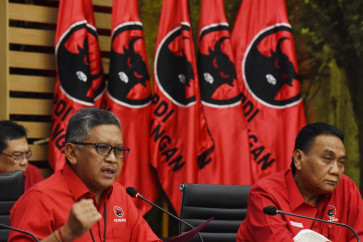National Teachers’ Day: Teaching – least desirable, yet most indispensable profession
As a high school teacher, I conduct a survey each year with my Grade 12 students as the respondents
Change Size

As a high school teacher, I conduct a survey each year with my Grade 12 students as the respondents. One question in the survey is about their dream job. Most of the students want to be doctors, entrepreneurs, politicians or bankers – I hardly find students who want to be a teacher, perhaps only one among a hundred. Being a teacher is one of the least desirable professions because it is not promising career path. A widespread opinion among Indonesian society holds that being a teacher has become the last choice if you cannot make it in other careers. A body of research confirms that students from schools in Indonesia’s major cities rarely dream of being a teacher.
Prior to my stint at SPH (Sekolah Pelita Harapan) as a teacher, I was assigned to teach in North Sulawesi for seven years. Most of us know that there has been disparity between schools and education in rural and urban areas. But only after my seventh year of teaching in North Sulawesi, did I truly experience this fact. Most poor rural areas in Indonesia face a shortage of teachers, not to mention a lack of access to education. The number of teachers remains small.
ACDP Indonesia (Analytical and Capacity Development Partnership in Education Sector) finds that there has been an absence of teachers in many schools throughout Indonesia[1]. In 2013, ACDP found that 10 percent of teachers were absent. This usually happens due to several conditions, such as schools in remote areas with poor physical conditions, schools whose principal does not set a good example to the teachers, and many more. Moreover, there has been a low opinion of teachers. It is sad to know that their salaries are relatively low and they sometimes need to teach at several schools to earn more money, or they have to do other jobs to make a living. We understand that their situation frequently makes it hard for them to perform well at school.
Following my teaching experience in North Sulawesi, I got the opportunity to teach using an international curriculum at an international school. In contrast to schools in rural areas in Indonesia, international schools have a better curriculum and more advanced facilities. Furthermore, they have a rigorous selection process and higher standards when recruiting local teachers. International schools often recruit more expat teachers than locals. And as we all know that applies to most schools: the higher the quality, the higher the tuition fee, thus creating a huge gap in our society regarding access to education. From the teachers’ side, we have at least two major problems here: those who are more equipped in education do not want to be teachers, and yet there is an urgent need for well-equipped and responsible teachers throughout Indonesia.
The widespread low opinion of being a teacher must be changed; our mindset must be changed. Being a teacher is not lower than being a doctor, engineer or banker. On the contrary, being a teacher is a noble calling, for we are preparing future doctors, engineers, politicians, bankers and leaders. And take note here that I did not say being a teacher is a noble profession, but it is a noble calling. Many people have a low opinion of teachers because they see it in the lens of a profession, not a caling. If we value a profession from the highest salary, reputation or status, surely we would see teachers as a low profession. But if we see a teacher as a noble calling to educate the nation, would we still have a low opinion of being a teacher?
Indonesia needs more teachers who take pride in their profession, not because of their high salary or status or position or career path, but because they are aware that they are the spear tip of national development. We also need more faculties of education at universities that prepare and equip young teachers to be assigned to various places in Indonesia. We need more teachers who are called upon to educate the poor in the rural areas.

On the other hand, we as teachers also need a better curriculum from the government. For the past three years, I have taught Bahasa Indonesia at an international school using an international curriculum and, honestly, I am impressed with its system of grading. The grading is not only determined by the knowledge of Bahasa Indonesia grammar and comprehension, but also about the literary works. My students have to read 13 Indonesian literary works and then analyze it using literary theory. Students are trained not only to memorize or simply to find the most accurate answer, but also to analyze and to think critically. Critical thinking is one of the most important skills a student should have to lay a foundation for their future.
From time to time, the curriculum in Indonesia keeps changing and sometimes it makes it difficult for the teachers. We need a more stable and comprehensive national curriculum that enhances students’ skills and shape them to be lifelong learners and innovators.
Education is one of the primary indicators of a nation’s development. Indonesia will not move forward if we still lag far behind in education. I really hope that in the future, that both government and educational institutions work together as partners to create a more supportive system for Indonesian teachers, so that quality teachers can be continually enhanced for a better Indonesia.
________________________________
Francina Carolina, a Bahasa Indonesia teacher at SPH Lippo Village and Izzaura Abidin, is the school’s content writer.









